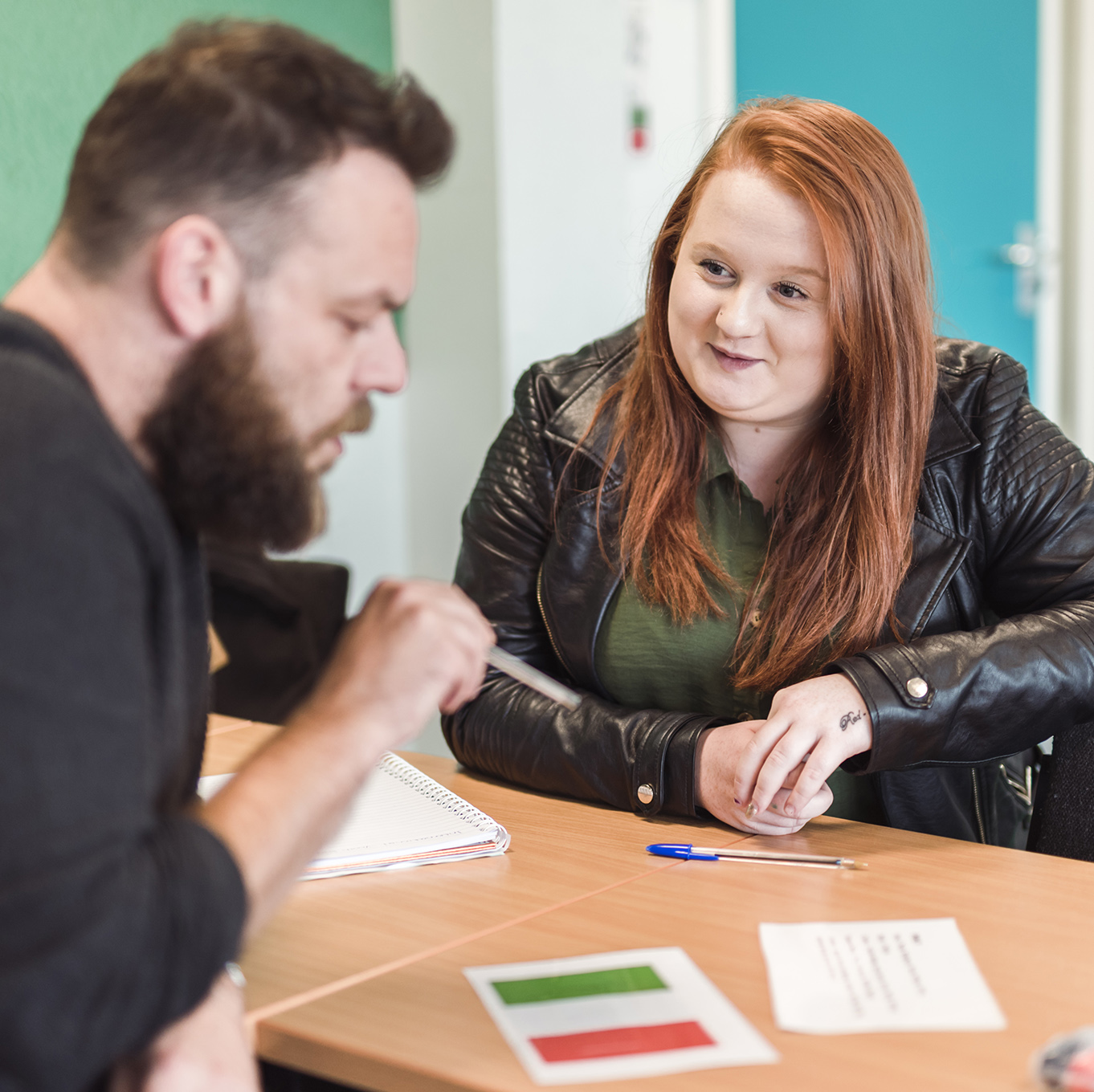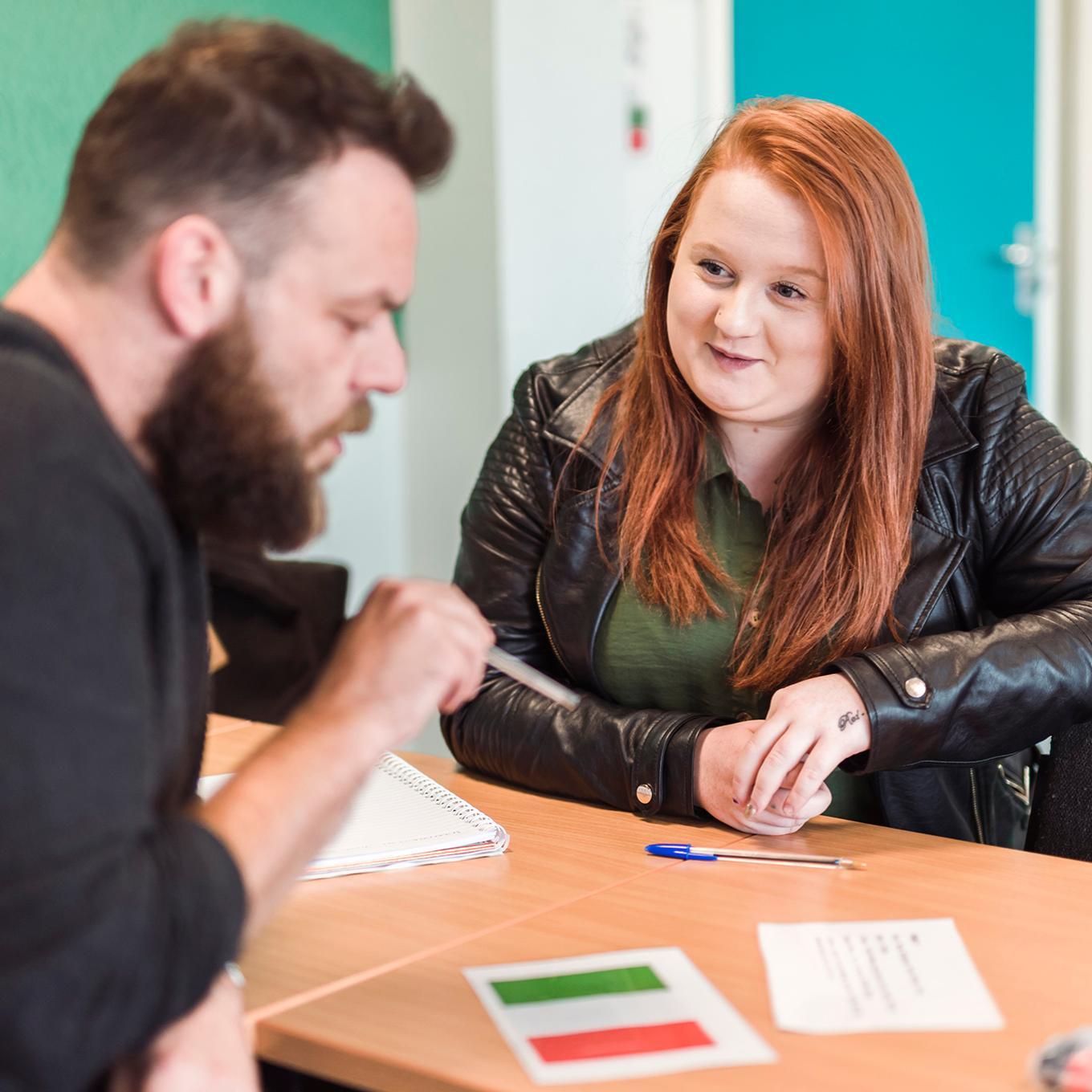Dip HE Health & Social Wellbeing (with Foundation Year)

Course details
UCAS Code
207F
Year of entry
2024, 2025
Duration
3 YRS (FT)
UCAS Tariff
48
Institution Code
G53
Location
Wrexham
Course Highlights
Strong links
to local employers to ensure teaching is relevant to current practice
2nd in the UK
for satisfaction with teaching (The Guardian University Guide 2022)*
Work-based learning
to explore real world issues, gain experience and develop your skills
Why choose? this course?
The Dip HE Health and Social Wellbeing course explores how we can help people to live happier and healthier lives. You will learn about what impacts on the health and mental health of individuals, communities and societies, and about different solutions that can help to address established and emerging issues.
Alongside this, you will be supported to develop the skills and confidence that are important for working in the field of health and wellbeing. You will take part in work-based learning in an area of your own interest, gaining ‘real world’ experience, and will develop your CV and other employability skills.
This course is ideal for those wishing to work in the field of health and social wellbeing, or who already work in the area but want to develop their knowledge to ensure that their practice is current and evidence-based.
This course:
- Develops a rounded understanding of the health, mental health and wellbeing of individuals and communities
- Involves 100 hours of work-based learning which you can tailor to your own area(s) of interest
- Has strong links with local employers
- Includes personal and professional development modules which help you develop a full CV and key skills for employability
- Offers a peer mentor scheme, providing support from and to other students.
- *Is part of a subject area rated 2nd in the UK and 1st in Wales for satisfaction with teaching and satisfaction with the course in the Health Professions subject league tables, The Guardian University Guide 2022.
- *Is part of a subject area rated 6th in the UK for teaching quality and 8th in the UK for student experience in the Subjects Allied to Medicine subject league tables, Times and Sunday Times Good University Guide 2022.
A foundation year is available for students who may not meet the criteria for entry to the 2-year route. The foundation year introduces the student to the key study skills and foundational knowledge essential to successful completion of the Diploma
Please note, the foundation year can only be studied as a full time option.

Health and WellbeingWrexham University
Thinking of a career in Health and Wellbeing? Hear from lecturers and students about our various Health and Wellbeing degrees at Wrexham University.
Key course features
- This degree takes a cutting-edge approach to health and wellbeing, exploring how to help individuals and communities to lead happier and healthier lives
- The programme team work with local employers to ensure that the content of the course is directly relevant to current practice in the sector.
- To support you on your journey there is an established peer mentor scheme so that students already undertaking the programme can help you by sharing their knowledge and experience
- Teaching is innovative and interactive, so you will learn through discussions, workshops, lectures, tutorials, case studies, online activities such as quizzes, and much more.
- In year two of the degree, you will take part in work-based learning, which you tailor to your own area/s of interest, providing you with real-world experience
- When you complete your qualification, you have the opportunity to ‘top up’ to a degree (BSc Public Health and Wellbeing or BSc Mental Health and Wellbeing).
- Delivered by academics from a range of backgrounds, which means that you will be part of a diverse community of practice.
Foundation Year:
The foundation year provides the opportunity to develop the skills and knowledge to succeed in higher education.
What you will study
YEAR 1 (FOUNDATION YEAR)
The Foundation Year is an integrated year where you will study core modules with a broad range of students from across the Faculty of Social and Life Sciences, giving you access to different perspectives and networking opportunities.
The modules will equip you with key skills needed for Higher Education and beyond. They will give you the chance to explore your subject area and available careers, allowing you to adapt your reading and assessments to be relevant to your degree pathway.
Alongside teaching from the broader faculty staff, you will be able to meet with staff and other students from your main degree pathway and get involved with events and opportunities that they are running.
- Study Skills for Success (core) will give you a solid foundation in academic conventions and time management skills to help you to progress through your degree.
- Resilience in Higher Education and Beyond (Core) Personal development and resilience are as important as academic skills in the accomplishment on your journey towards graduation, and this exciting new module will equip you with the attributes needed for this.
- A Day in the Life (core) This module allows you to explore the potential career options open to you on completion of you chosen degree. You will be exploring the professions linked to your degree and start preparing your graduate portfolio for employers.
- Life and Work in the Welsh Context (core) will give you the opportunity to explore your subject area and/or desired career in relation to living and working in today’s Wales.
The suite of optional modules are designed to enhance your skills base in relation to your career development. Your personal tutor from your degree will meet with you to help you decide which one of the available optional modules would be most suitable for you. The optional modules are:
- Welsh for First Time Learners provides an introduction to the Welsh language for those taking their first steps Numeracy where your degree requires a competent level of numeracy, you may be advised to choose this option.
- Professional Communication in the Workplace in this module, you will begin to develop the skills and aptitude necessary to communicate effectively in a professional context.
- Maths and Experimental Design if your degree pathway requires an understanding of numeracy and sciences, then this module is designed to provide the opportunity to achieve that.
There are a variety of assessments across the foundation year – presentations, portfolios, electronic scrapbooking, and learning logs are just some.
YEAR 2 (LEVEL 4)
This year involves establishing your understanding of key concepts in the field of health, mental health and wellbeing, as well as developing the skills for studying in Higher Education.
MODULES
- Study Skills and Personal Development (Core): This module will enable students to develop key knowledge and skills for learning in Higher Education and working in health, mental health and wellbeing settings, as well as support them to set goals for personal, academic and professional development.
- Health of the Nation: State of Play (Core): This module will introduce students to the ‘state’ of people’s health in local and national contexts, identifying common physical and mental health problems and their risk factors, as well as the sectors in which they are usually treated.
- Health, Wellbeing and the Body (Core): This module will provide students with knowledge and understanding of the functioning of the body, including key health behaviours that help to maintain normal physiology, and the signs and symptoms of common physical and mental health problems.
- Health Inequalities and Social Justice (Core): This module will enable students to recognise inequalities in health, mental health and wellbeing and understand their personal role in contributing to the social justice agenda.
- Key Concepts in Health, Mental Health and Wellbeing (Core): This module will provide students with a grounding in key theoretical concepts needed to study public health, mental health and wellbeing, encouraging them to question common assumptions and develop a more reality congruent understanding of concepts and issues.
YEAR 3 (LEVEL 5)
This year consolidates and further develops your learning, helping you to expand and apply your knowledge, and to develop a toolbox of personal and professional skills for employment. You also complete 100 hours of work based learning which allows you to explore an area of personal and professional interest.
MODULES
- Personal and Professional Development (Core): Through taught sessions and a Work-Based Learning, this module will enable students to continue developing their personal, academic and professional skills and explore contemporary workplace issues such as emotional resilience, and person-centred approaches and evidence-based practice.
- Health Behaviour across the Life Course (Core): This module will provide knowledge and understanding of models and theories that explain human development and behaviour across the life course, and discuss their application to health, mental health and wellbeing-related behaviour.
- Mental Health and the Body (Core): This module will explore the links between physical and mental health, including the relationship between lifestyle factors, preventable health problems and mental ill health.
- Preparing for Real World Research in Health (Core): This module will provide students with knowledge and understanding of the nature of research, its value and place in the field of health, mental and wellbeing, and the research process.
- Strategies for Health Improvement and Promotion (Core): This module will provide students with knowledge and understanding of established strategies for promoting and improving health, mental health and wellbeing, such as social prescribing, health education and a ‘settings approach’, as well as their application within specific populations.
- Policy and Practice in Public Health (Core): This module will provide students with knowledge and understanding of politics, the policy process and key public health policies.
The information listed in this section is an overview of the academic content of the programme that will take the form of either core or option modules. Modules are designated as core or option in accordance with professional body requirements and internal academic framework review, so may be subject to change.
Entry requirements & applying
The general requirement for admission to the Foundation Year is 48 UCAS points at A level or equivalent – this includes relevant Access to Higher Education courses. Applicants should be able to demonstrate the emotional and psychological maturity to work with vulnerable people and the resilience needed to cope with the demands in this sector.
For students without the standard entry qualifications, it may be possible to take this course if you have additional life or work experience and can demonstrate an ability to engage with the academic challenges of the programme. Candidates without standard entry requirements may be invited to interview.
Applicants do not require a DBS for the programme, although a DBS may be required for work-based learning according to the requirements of the provider organisation.
Teaching & Assessment
You will be taught using a variety of active learning methods, including discussions, case studies, lectures, quizzes, and forums.
Assessments on this programme are varied, allowing you to develop and showcase a range of skills. They include portfolios, talks, essays, reflective writing, presentations, and an exam.
For each 20 credit module, you will receive 36 active learning and teaching hours during year one (level four), and 30 hours at year two (level five), and will also be expected to complete independent study including key reading.
If students complete a foundation year (Year 0/level three) they will receive 40 hours active learning and teaching hours per 20-credit module.
The programme has strong links with the Learning Support services, to enable students to access a wide range of help to develop their skills for studying in higher education.
Wrexham University is committed to supporting our students to maximise their academic potential.
We offer workshops and support sessions in areas such as academic writing, effective note-making and preparing for assignments. Students can book appointments with academic skills tutors dedicated to helping deal with the practicalities of university work. Our student support section has more information on the help available.
In terms of particular needs, the University’s Inclusion Services can provide appropriate guidance and support should any students require reasonable adjustments to be made because of a recognised prevailing disability, medical condition, or specific learning difference.
Career prospects
The health and wellbeing sector is an exciting and dynamic arena. This course is designed to equip students with knowledge and skills relevant to a diverse range of existing and new roles across sectors, which might include community health development, social prescribing, advocacy, health improvement, third sector project work, befriending and many more.
Developing your employability skills and confidence is a key part of this course. Students will complete work-based learning in a setting of their choice, develop their CV and reflect on and enhance their skillset.
When students have successfully completed their qualification, they have the option to ‘top up’ to either the BSc Mental Health and Wellbeing or BSc Public Health and Wellbeing.
Our Careers & Employability service is there to help you make decisions and plan the next steps towards a bright future. From finding work or further study to working out your interests, skills and aspirations, they can provide you with the expert information, advice and guidance you need.
This course is designed to equip students with a range of knowledge and skills relevant to a diverse range of roles across sectors. These might include community health development, social prescribing, advocacy, third sector project work, befriending and many more. Students are supported to develop a CV and to consider how to respond and adapt to a dynamic employment landscape.
Fees & funding
You do not have to pay your tuition fees upfront.
The fees you pay and the support available will depend on a number of different factors. Full information can be found on our fees & finance pages. You will also find information about what your fees include in the fee FAQs.
All fees are subject to any changes in government policy, view our undergraduate fees.
Programme specification
Accommodation
If you’re looking for a place to stay while you study then take a look at our accommodation pages to get more information on your options, including our on-campus halls of residence Wrexham Village.

